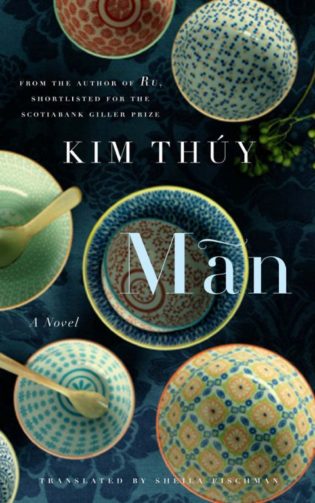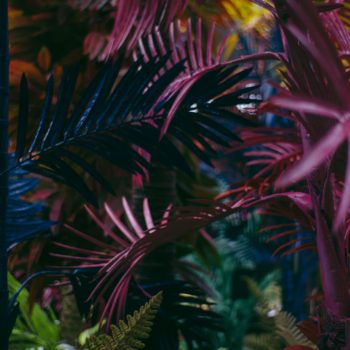
Best Books We Read in 2018
- Posted by Augur Blog
- On December 21, 2018
- 2 Comments
- Asano Inio, best of 2018, Esi Edugyan, Friday Black, Hiromi Goto, Hopeful Monsters, Indra Das, Kim Thúy, Larissa Lai, Mãn, Nana Kwame Adjei-Brenyah, Solanin, The Devourers, Vita Nostra, Washington Black, When Fox is a Thousand
When the Augur team is not reading submissions, we read books and here is a roundup of our favourites from 2018. Get your TBR ready.
Friday Black by Nana Kwame Adjei-Brenyah

Friday Black, the debut book by Nana Kwame Adjei-Brenyah, is one of the best contemporary short fiction collections I’ve read in a very long time. Each story shone brightly and steadfastly with an expert plot and pace, sharp themes and relatable characters.
Adjei-Brenyah, through his writing, also provides vicious social commentary on race relations, capitalism and possible futures in North America. Why is this book here? Friday Black is a work of speculative fiction.
From a dystopia where people strive for total, emotionless honesty, to a school shooter working with his victim in the afterlife to prevent the next catastrophe, to a zombie-like Black Friday retail infection—Adjei-Brenyah’s stories are works of intensely political, surrealist, fabulism. I particularly like this work not only because I enjoy reading the work of black speculative fiction authors, but because this is the kind of exciting speculative fiction I strive to write. In the words of Roxanne Gay: “Read this book.”
– Terese
Jade City by Fonda Lee

With Jade City, Fonda Lee has written a gorgeous, gripping urban fantasy with vivid fight sequences and layered and intricate worldbuilding. On the island of Kekon, clans of trained warriors known as Green Bones have used jade for centuries to enhance their magical abilities and defend against foreign invasion. But in the wake of peace, the clans have turned their minds to business and politics. When a new drug that allows anyone to use jade emerges, tensions between the two largest clans in Kekon rise, and war breaks out. Following the siblings leading the No Peak clan, we watch how war is waged both in the streets and in the boardroom. Family relationships lie at the heart of this novel, and we see how family legacies both empower and constrict the characters. The sequel, Jade War, will be out in July 2019, so you have lots of time to read the first book before then.
– Alex
The Fairy Tale Museum by Susannah M. Smith

I am easily enchanted by
The best part is that when you get to the end, you realize that you don’t need to read this book in order. You can start from back to front. “Pull out drawers” at random. Come up with your own special order. I love the idea! Susannah M. Smith’s writing is poetic and hypnotic and this book was a lovely ode to imagination.
– Anna
Mãn by Kim Thúy

Mãn was my introduction to Kim Thúy, who I was lucky enough to see live this year at the FOLD (in a delightful panel with Lee Maracle). Thúy’s story—and the translation by Sheila Fischman—is gorgeous, rich but clean. I haven’t loved a book just for its sentence-level writing this much…maybe just ever. Now, keep in mind, this isn’t a speculative book—but this is definitely the kind of realism I’d love to see Augur receive more of.
– Kerrie
Witchbody by Sabrina Scott

Early in Witchbody, Sabrina Scott describes witchcraft as “a body pedagogy that makes sense of the idea that other bodies may feel us too.” In her deeply unconventional Master’s thesis, Scott creates a graphic novel that communicates her messages better than any traditional academic paper could. On one hand, she cites Donna Haraway, Sara Ahmed, Slavoj Zizek, and so forth; on the other, the book is rich with accessible, vivid imagery. Lines of black and white snake through her depictions of Toronto and elsewhere; panels depict moments both mundane and occult. Through
This book was gifted to me at the right time. Having just finished my own undergraduate degree with a deeply personal essay that was somewhat of an autoethnography itself, this feels like the transition I need from academia into something else, something more life-giving, more world-making. Perhaps something more speculative. My fingers come away stained with ink just as Sabrina Scott intended, and each time I thumb through I leave more fingerprints on the pages. Though they are light, this noticeable accumulation of my own presence in the book neatly parallels my sense of steady growth and survival
– Victoria
When Fox Is a Thousand by Larissa Lai

I read this book at the very start of the year, but it’s probably my favourite read of 2018. This is not a new book—I’m catching up on my Canadian spec fic, and Larissa Lai is at the top of the list. This story is eerie and beautiful, switching between contemporary and historical settings, it’s sometimes crisp, stark realism woven with magic.
Lai is a master of toeing the line between the real and unreal, and both are equally enjoyable. (It’s also pretty gay, which is great.)
– Kerrie
Washington Black by Esi Edugyan

Washington Black is a novel that works so hard on so many levels, but it never shows its hand. The book is a thrilling adventure tale, a detailed character study, and an ever-unfolding mystery. It’s an exploration of what freedom truly means, set during a time when the word carried both enormous weight and almost no weight at all. Young Wash stole my heart, and he continues to walk with it past the book’s final pages.
– Mado
Hopeful Monsters by Hiromi Goto

Hiromi Goto is the God of quiet Canadian speculative fiction, as far as I’m concerned, and this collection of short stories only confirms it. There’s a story in here about pregnancy that is just oh-so-speculative in a hilarious and (maybe?) horrific way, and it is the most honest short story I have possibly ever read. This is absolutely one of those collections that needs to be read and read and read again.
– Kerrie
Solanin by Asano Inio

2018 was the year I finally cracked some Inio Asano. After the outpouring of fans at his TCAF appearance, I burned my way through the majority of his work to date. I love the detailed, visceral feel of Asano’s art and the strange worlds that he creates out of the modern Japanese urban setting. Although not purely speculative, the dreamlike, floaty atmosphere and the dark surreal moments creates a tension that is hard to resist.
Out of his works, I particularly connected with Solanin this year (the questioning of one’s life path on the verge of a quarter-life crisis was all too real to my 24-year-old self). I highly recommend this work to anyone going through the post-grad blues, when the scariest thing of all is the slow encroaching of the mundane and the feeling of your dreams slipping through your fingers.
– Amy
The Devourers by Indra Das

I’d been meaning to read this book since it came out! I will admit, though, I went into it skeptical nonetheless—I am not a werewolf person (due to a deep-seated unease since childhood). But Indrapramit Das’s writing is evocative, and The Devourers envelops you in a story like a dream. I am not quite a werewolf person, but I am definitely less skeptical—and also, very definitely a fan.
– Kerrie
Vita Nostra by Marina & Sergey Dyachenko

Vita Nostra was THE book of 2018 for me. I have never heard of the Dyachenkos until Julia Meitov Hersey’s brilliant translation brought the work of this incredible Russian-Ukrainian writing team to North America.
Metaphysics, grammar, coming-of-age in 90s Russia, magic school, family drama and bird-women could not possibly all fit together to make a great speculative novel—but they do. This book was tricky and mind-bending (I am still unspooling bits of it in my mind), but it was totally original, dark and thought-provoking. There are sentences in here that are so beautiful they made my inner book nerd weak at the knees. I loved it so much, I had to write a crazy long, fevered review of it on Goodreads.
– Anna
What have you read this year?




2 Comments